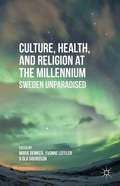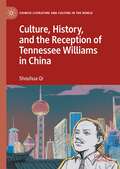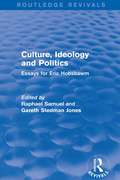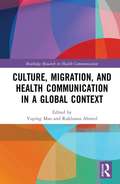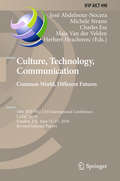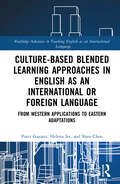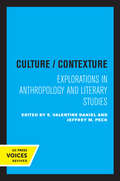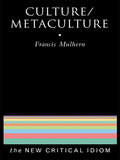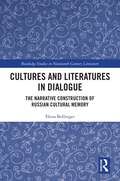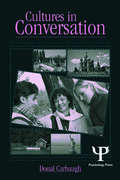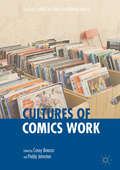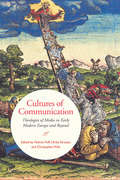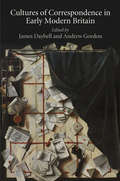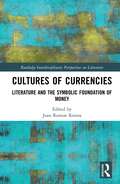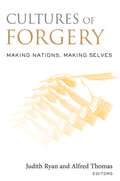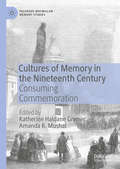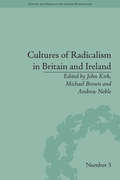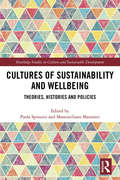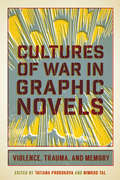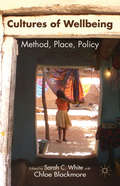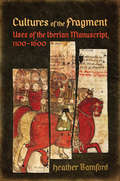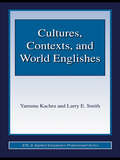- Table View
- List View
Culture, Health, and Religion at the Millennium: Sweden Unparadised
by Ola Sigurdson Marie Demker Yvonne LefflerThe book presents interpretations of culture, health, politics, and religion in Sweden today, Sweden transforms from the well-functioning but existentially bland economic wonder to a more fragmented and gloomy society. Contributors include scholars from film studies, literary studies, political science, religious studies and theology
Culture, History, and the Reception of Tennessee Williams in China (Chinese Literature and Culture in the World)
by Shouhua QiThis book is the first comprehensive study of the reception of Tennessee Williams in China, from rejection and/or misgivings to cautious curiosity and to full-throated acceptance, in the context of profound changes in China’s socioeconomic and cultural life and mores since the end of the Cultural Revolution. It fills a conspicuous gap in scholarship in the reception of one of the greatest American playwrights and joins book-length studies of Chinese reception of Shakespeare, Ibsen, O’Neill, Brecht, and other important Western playwrights whose works have been eagerly embraced and appropriated and have had catalytic impact on modern Chinese cultural life.
Culture, Ideology and Politics (Routledge Revivals): Essays for Eric Hobsbawm
by Raphael Samuel and Gareth Stedman JonesFirst published in 1982, this book is inspired the ideas generated by Eric Hobsbawm, and has taken shape around a unifying preoccupation with the symbolic order and its relationship to political and religious belief. It explores some of the oldest question in Marxist historiography, for example the relationship of ‘base’ and ‘superstructure’, art and social life, and also some of the newest and most problematic questions, such as the relationship of dreams and fantasy to political action, or of past and present — historical consciousness — to the making of ideology. The essays, which range widely over period and place, are intended to break new ground and take on difficult questions.
Culture, Migration, and Health Communication in a Global Context (Routledge Research in Health Communication)
by Yuping Mao Rukhsana AhmedBoth international and internal migration brings new challenges to public health systems. This book aims to critically review theoretical frameworks and literature, as well as discuss new practices and lessons related to culture, migration, and health communication in different countries. It features research and applied projects conducted by scholars from various disciplines including media and communication, public health, medicine, and nursing.
Culture, Technology, Communication. Common World, Different Futures: 10th IFIP WG 13.8 International Conference, CaTaC 2016, London, UK, June 15-17, 2016, Revised Selected Papers (IFIP Advances in Information and Communication Technology #490)
by Charles Ess José Abdelnour-Nocera Michele Strano Maja Van der Velden Herbert HrachovecThis volume constitutes the refereed post-conference proceedings of the 10th IFIP WG 13. 8 International Conference on Culture, Technology, and Communication, CaTaC 2016, held in London, UK, in June 2016. The 9 revised full papers were carefully reviewed and selected from 22 submissions. The papers explore the intersections between culture, technology, and communication, applying different theoretical and methodological perspectives, genres, and styles. They deal with cultural attitudes towards technology and communication, interaction design, and international development.
Culture-Based Blended Learning Approaches in English as an International or Foreign Language: From Western Applications to Eastern Adaptations (Routledge Advances in Teaching English as an International Language Series)
by Shen Chen Putri Gayatri Helena SitThis book provides rich information about the historical development and progress of blended learning with a focus on the field of English as an International Language (EIL) or English as a Foreign Language (EFL) area.The authors examine various models of blended learning used in the USA, UK, Australia, and Asia before establishing a comprehensive model in accordance with the socio-cultural context of a country. The book further investigates the implementation of the model in EIL/EFL classrooms. The research was conducted using a library research method to collect rich data, enabling extensive international literature to be critically reviewed by the authors for an Asian setting. The book concludes by providing readers with constructive recommendations for future practice of blended learning in EIL/EFL in Asia and other non- English speaking countries.This volume will be of value to researchers, educators, and higher degree students who are interested in second and foreign language education and English as an International Language or a Foreign Language. It will also be a valuable resource for EIL/EFL and other foreign language teachers, particularly in an Asian cultural context.
Culture/Contexture: Explorations in Anthropology and Literary Studies
by E. Valentine Daniel Jeffrey M. PeckThe rapprochement of anthropology and literary studies, begun nearly fifteen years ago by such pioneering scholars as Clifford Geertz, Edward Said, and James Clifford, has led not only to the creation of the new scholarly domain of cultural studies but to the deepening and widening of both original fields. Literary critics have learned to "anthropologize" their studies—to ask questions about the construction of meanings under historical conditions and reflect on cultural "situatedness." Anthropologists have discovered narratives other than the master narratives of disciplinary social science that need to be drawn on to compose ethnographies.Culture/Contexture brings together for the first time literature and anthropology scholars to reflect on the antidisciplinary urge that has made the creative borrowing between their two fields both possible and necessary. Critically expanding on such pathbreaking works as James Clifford and George Marcus's Writing Culture and Marcus and Michael M. J. Fischer's Anthropology as Cultural Critique, contributors explore the fascination that draws the disciplines together and the fears that keep them apart. Their topics demonstrate the rich intersection of anthropology and literary studies, ranging from reading and race to writing and representation, incest and violence, and travel and time. This title is part of UC Press's Voices Revived program, which commemorates University of California Press’s mission to seek out and cultivate the brightest minds and give them voice, reach, and impact. Drawing on a backlist dating to 1893, Voices Revived makes high-quality, peer-reviewed scholarship accessible once again using print-on-demand technology. This title was originally published in 1996.
Culture/Metaculture (The New Critical Idiom)
by Francis MulhernCulture/Metaculture is a stimulating introduction to the meanings of 'culture' in contemporary Western society. This essential survey examines: * culture as an antidote to 'mass' modernity, in the work of Thomas Mann, Julien Benda, José Ortega y Gasset, Karl Mannheim and F. R. Leavis* changing views of the term in the work of Sigmund Freud, Virginia Woolf, George Orwell, T. S. Eliot and Richard Hoggart* post-war theories of 'popular' culture and the rise of Cultural Studies, paying particular attention to the key figures of Raymond Williams and Stuart Hall* theories of 'metaculture', or the ways in which culture, however defined, speaks of itself. Francis Mulhern's interdisciplinary approach allows him to draw out the fascinating links between key political issues and the changing definitions of culture. The result is an unrivalled introduction to a concept at the heart of contemporary critical thought.
Cultures and Literatures in Dialogue: The Narrative Construction of Russian Cultural Memory (Routledge Studies in Nineteenth Century Literature)
by Elena BollingerThis book addresses the narrative construction of Russian cultural memory in the work of Julian Barnes. It investigates how Barnes's texts tend to display a memory process as a transcultural mode of the creation of English and Russian national identities. Examining a need to revisit Russian canonical works, the detailed discursive analysis of the selected English texts exposes an intertextual remembering by duplication, thus contributing to the prevention of forgetting through the recuperation of still misrecollected cultural meanings. By creatively incorporating Russian intertextual elements into his work as a novelist, the author seems to insist on sweeping across and beyond national boundaries, revealing how frail the invention of tradition is when leading to the illusion of a solid collective memory and its political legitimation. The book considers not only a constructive dialogue between Barnes’s fiction and Russian classical literature, but also this writer’s interpretative, mostly imaginative, integration of Russian literature and culture into his work as a novelist. Exploring the double meaning of a literary metaphor as a mnemonic image of memory and a product of imagination, it offers a comprehensive analysis of Barnes’s texts which play with intertextuality as an efficient tool of displacement of official memory, providing a deeper understanding of historical and cultural processes related to the constantly moving architecture of transcultural memory.
Cultures in Conflict (Great Minds Wit & Wisdom #Grade 5, Module 1)
by Ann Brigham Lauren Chapalee Lorraine GriffithNIMAC-sourced textbook
Cultures in Conflict: Assessment Pack (Great Minds Wit & Wisdom #Grade 5, Module 1)
by Ann Brigham Lauren Chapalee Lorraine GriffithNIMAC-sourced textbook
Cultures in Contact: Studies in Cross-cultural interaction
by Stephen BochnerAlthough dated, this text presents research regarding cross-cultural interaction.
Cultures in Conversation (Routledge Communication Series)
by Donal CarbaughCultures in Conversation introduces readers to the ethnographic study of intercultural and social interactions through the analysis of conversations in which various cultural orientations are operating. Author Donal Carbaugh presents his original research on conversation practices in England, Finland, Russia, Blackfeet County, and the United States, demonstrating how each is distinctive in its communication codes--particularly in its use of symbolic meanings, forms of interaction, norms, and motivational themes. Examining conversation in this way demonstrates how cultural lives are active in conversations and shows how conversation is a principal medium for the coding of selves, social relationships, and societies. Representing 20 years of research, this volume offers unique insights into the ways social interactions not only gain shape from, but also are formative of cultures. It makes a significant contribution to communication scholarship, and will be illuminating reading in courses focusing on cultural communication, language and social interaction, intercultural pragmatics, and linguistics.
Cultures of Comics Work (Palgrave Studies in Comics and Graphic Novels)
by Casey Brienza Paddy JohnstonThis anthology explores tensions between the individualistic artistic ideals and the collective industrial realities of contemporary cultural production with eighteen all-new chapters presenting pioneering empirical research on the complexities and controversies of comics work. Art Spiegelman. Alan Moore. Osamu Tezuka. Neil Gaiman. Names such as these have become synonymous with the medium of comics. Meanwhile, the large numbers of people without whose collective action no comic book would ever exist in the first place are routinely overlooked. Cultures of Comics Work unveils this hidden, global industrial labor of writers, illustrators, graphic designers, letterers, editors, printers, typesetters, publicists, publishers, distributors, translators, retailers, and countless others both directly and indirectly involved in the creative production of what is commonly thought of as the comic book. Drawing upon diverse theoretical and methodological perspectives, an international and interdisciplinary cohort of cutting-edge researchers and practitioners intervenes in debates about cultural work and paves innovative directions for comics scholarship.
Cultures of Communication: Theologies of Media in Early Modern Europe and Beyond
by Helmut Puff Christopher Wild Ulrike StrasserContrary to the historiographical commonplace “no Reformation without print” Cultures of Communication examines media in the early modern world through the lens of the period’s religious history. Looking beyond the emergence of print, this collection of ground-breaking essays highlights the pivotal role of theology in the formation of the early modern cultures of communication. The authors assembled here urge us to understand the Reformation as a response to the perceived crisis of religious communication in late medieval Europe. In addition, they explore the novel demands placed on European media ecology by the acceleration and intensification of global interconnectedness in the early modern period. As the Christian evangelizing impulse began to propel growing numbers of Europeans outward to the Americas and Asia, theories and practices of religious communication had to be reformed to accommodate an array of new communicative constellations – across distances, languages, cultures.
Cultures of Correspondence in Early Modern Britain (Material Texts)
by Andrew Gordon James DaybellThe letter is a powerfully evocative form that has gained in resonance as the habits of personal letter writing have declined in a digital age. But faith in the letter as evidence of the intimate thoughts of individuals underplays the sophisticated ways letters functioned in the past. In Cultures of Correspondence in Early Modern Britain leading scholars approach the letter from a variety of disciplinary perspectives to uncover the habits, forms, and secrets of letter writing. Where material features of the letter have often been ignored by past generations fixated on the text alone, contributors to this volume examine how such elements as handwriting, seals, ink, and the arrangement of words on the manuscript page were significant carriers of meaning alongside epistolary rhetorics. The chapters here also explore the travels of the letter, uncovering the many means through which correspondence reached a reader and the ways in which the delivery of letters preoccupied contemporaries. At the same time, they reveal how other practices, such as the use of cipher and the designs of forgery, threatened to subvert the surveillance and reading of letters.The anxiety of early modern letter writers over the vulnerability of correspondence is testament to the deep dependence of the culture on the letter. Beyond the letter as a material object, Cultures of Correspondence sheds light on textual habits. Individual chapters study the language of letter writers to reveal that what appears to be a personal and unvarnished expression of the writer's thought is in fact a deliberate, skillful exercise in managing the conventions and expectations of the form. If letters were a prominent and ingrained part of the cultural life of the early modern period, they also enjoyed textual and archival afterlives whose stories are rarely told. Too often studied only in the case of figures already celebrated for their historical or literary significance, the letter in Cultures of Correspondence emerges as the most vital and wide-ranging material, textual form of the early modern period.Contributors: Nadine Akkerman, Mark Brayshay, Christopher Burlinson, James Daybell, Jonathan Gibson, Andrew Gordon, Arnold Hunt, Lynne Magnusson, Michelle O'Callaghan, Alan Stewart, Andrew Zurcher.
Cultures of Currencies: Literature and the Symbolic Foundation of Money (Routledge Interdisciplinary Perspectives on Literature)
by Joan Ramon ResinaThis book’s premise is not only the commonly accepted cultural relativity of economic concepts, but also the observation that the current shift in the meaning of concepts like “market,” “currency,” “exchange,” and “money” suggests that culture is undergoing a change with unpredictable economic and political consequences. The essays in the book raise basic questions concerning exchange – what is exchanged, who exchanges and how, which kind of currency is used, and indeed what is money and how does it convey and retain value over time. These issues are all classical objects of economic theory, but less often have they been approached from a cultural perspective. Works treating economic and monetary issues from a cultural perspective are few and far apart, and this book aims to contribute to such a perspective with a variety of approaches.
Cultures of Forgery: Making Nations, Making Selves (CultureWork: A Book Series from the Center for Literacy and Cultural Studies at Harvard)
by Judith Ryan Alfred ThomasIn Cultures of Forgery, leading literary studies and cultural studies scholars examine the double meaning of the word "forge"-to create or to form, on the one hand, and to make falsely, on the other.
Cultures of Memory in the Nineteenth Century: Consuming Commemoration (Palgrave Macmillan Memory Studies)
by Amanda R. Mushal Katherine Haldane GrenierThis collection provides a long-overdue examination of the nineteenth century as a crucible of new commemorative practices. Distinctive memory cultures emerged during this period which would fundamentally reshape public and private practices of remembrance in the modern world. The essays in this volume bring together scholars of History, Literature, Art History, and Musicology to explore uses of memory in nineteenth-century empire-building and constructions of national identity, cultures of sentiment and mourning practices, and discourses of race and power. Contributors approach the topic through case studies of Europe, the United States, and the British Empire. Their analyses of nineteenth-century innovations in commemoration at both the personal and the larger civic and political levels will appeal to students and scholars of memory and of the nineteenth-century world.
Cultures of Radicalism in Britain and Ireland (Poetry and Song in the Age of Revolution #3)
by John KirkThis collection of essays addresses the role of literature in radical politics. Topics covered include the legacy of Robert Burns, broadside literature in Munster and radical literature in Wales.
Cultures of Sustainability and Wellbeing: Theories, Histories and Policies (Routledge Studies in Culture and Sustainable Development)
by Massimiliano Mazzanti Paola SpinozziCultures of Sustainability and Wellbeing: Theories, Histories and Policies examines and assesses the interdependence between sustainability and wellbeing by drawing attention to humans as producers and consumers in a post-human age. Why wellbeing ought to be regarded as essential to sustainable development is explored first from multifocal theoretical perspectives encompassing sociology, literary criticism and socioeconomics, second in relation to institutions and policies, and third with a focus on specific case studies across the world. Wellbeing and its sustainability are defined in terms of biological and cultural diversity; stages of advancement in science and technology; notions of citizenship and agency; geopolitical scenarios and environmental conditions. Wellbeing and sustainability call for enquiries into human capacities in ontological, epistemological and practical terms. A view of sustainability that revolves around material and immaterial wellbeing is based on the assumption that life quality, comfort, happiness, security, safety always posit humans as both recipients and agents. Risk and resilience in contemporary societies define the intrinsically human ability to make and consume, to act and adapt, driving the search for and fruition of wellbeing. How to sustain the dual process of exploitation and regeneration is a task that requires integrated approaches from the sciences and the humanities, jointly tracing a worldwide cartography with clear localisations. This book will be of great interest to students and researchers interested in sustainability through conceptual and empirical approaches including social theory, literary and cultural studies, environmental economics and human ecology, urbanism and cultural geography.
Cultures of War in Graphic Novels: Violence, Trauma, and Memory
by Nimrod Tal Tatiana Prorokova Iain A. MacInnes Kenton Worcester Emir Pasanovic Harriet E.H. Earle James Kelley Joe Lockard Christina M. Knopf Peter C. Valenti Silvia G. Kurlat Ares Yasmine Nachabe TaanCultures of War in Graphic Novels examines the representation of small-scale and often less acknowledged conflicts from around the world and throughout history. The contributors look at an array of graphic novels about conflicts such as the Boxer Rebellion (1899-1901), the Irish struggle for national independence (1916-1998), the Falkland War (1982), the Bosnian War (1992-1995), the Rwandan genocide (1994), the Israel-Lebanon War (2006), and the War on Terror (2001-). The book explores the multi-layered relation between the graphic novel as a popular medium and war as a pivotal recurring experience in human history. The focus on largely overlooked small-scale conflicts contributes not only to advance our understanding of graphic novels about war and the cultural aspects of war as reflected in graphic novels, but also our sense of the early twenty-first century, in which popular media and limited conflicts have become closely interrelated.
Cultures of Wellbeing: Method, Place, Policy
by Sarah C. White Chloe BlackmoreThe authors challenge psychological perspectives on happiness and subjective wellbeing. Highlighting the politics of quantitative and qualitative methodologies, case studies across continents explore wellbeing in relation to health, children and youth, migration, economics, religion, family, land mines, national surveys, and indigenous identities.
Cultures of the Fragment: Uses of the Iberian Manuscript, 1100-1600 (Toronto Iberic)
by Heather BamfordThe majority of medieval and sixteenth-century Iberian manuscripts, whether in Latin, Hebrew, Arabic, Spanish or Aljamiado (Spanish written in Arabic script), contain fragments or are fragments. The term fragment is used to describe not only isolated bits of manuscript material with a damaged appearance, but also any piece of a larger text that was intended to be a fragment. Investigating the vital role these fragments played in medieval and early modern Iberian manuscript culture, Heather Bamford’s Cultures of the Fragment is focused on fragments from five major Iberian literary traditions, including Hispano-Arabic and Hispano-Hebrew poetry, Latin and Castilian epics, chivalric romances, and the literature of early modern crypto-Muslims. The author argues that while some manuscript fragments came about by accident, many were actually created on purpose and used in a number of ways, from binding materials, to anthology excerpts, and some fragments were even incorporated into sacred objects as messages of good luck. Examining four main motifs of fragmentation, including intention, physical appearance, metonymy, and performance, this work reveals the centrality of the fragment to manuscript studies, highlighting the significance of the fragment to Iberia’s multicultural and multilingual manuscript culture.
Cultures, Contexts, and World Englishes
by Yamuna Kachru Larry E. SmithThis volume aims to familiarize readers with the varieties of world Englishes used across cultures and to create awareness of some of the linguistic and socially relevant contexts and functions that have given rise to them. It emphasizes that effective communication among users of different Englishes requires awareness of the varieties in use and their cultural, social, and ideational functions. Cultures, Contexts and World Englishes: demonstrates the rich results of integrating theory, methodology and application features critical and detailed discussion of the sociolinguistics of English in the globalized world gives equal emphasis to grammar and pragmatics of variation and to uses of Englishes in spoken and written modes in major English-using regions of the world. Each chapter includes suggestions for further reading and challenging discussion questions and appropriate research projects designed to enhance the usefulness of this volume in courses such as world Englishes, English in the Global Context, Sociolinguistics, Critical Applied Linguistics, Language Contact and Convergence, Ethnography of Communication, and Crosscultural Communication.
